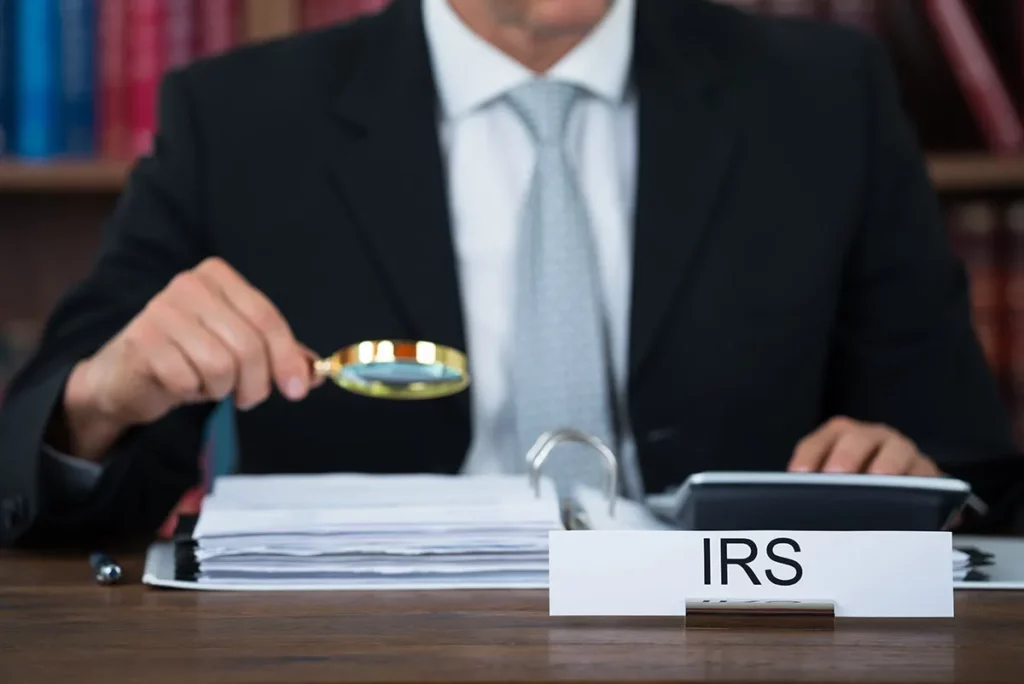
According to the Transactional Records Access Clearinghouse, less than half of one percent of people were audited for tax returns in 2021. While you may reasonably be scared about the IRS audit process, this small number of people who have actually gone through it means that there may be a lot of misinformation out there. The legal team at Damiens Law has helped clients who were selected for an audit. You can learn more by reading our answers to common questions regarding the IRS audit process or by calling us at (601) 957-9672 or (901) 499-4466.
What is an IRS audit?
According to the Internal Revenue Service (IRS), an IRS audit is a review of a taxpayer’s records that is conducted to determine if the taxpayer correctly reported their tax obligation to the IRS and to verify the amount owed or paid is accurate.
How will I be notified of an IRS audit?
You will typically be notified of an IRS audit by mail, either by certified or regular mail. The IRS notes that it will not initiate an audit by phone.
You will complete your audit either through mail or an in-person interview, which will be determined by the IRS. The IRS will provide instructions about the method of the audit and the information you will need to provide in its letter to you. You can also request an in-person interview if you have too much information to mail.
What are the different types of IRS audits?
When the IRS selects a taxpayer for an audit, there is something that has flagged the return in question. There are several different types of audits, and the type the IRS initiates can help reveal the purpose and strategy it intends to use.
Correspondence audit
A correspondence audit is completed solely through the mail. This is the most basic type of audit and usually used when the IRS detects a small error on your return and needs you to explain it. The purpose of this type of audit is to quickly and efficiently resolve tax problems through correspondence. It is much less invasive than other types of IRS audits.
Office audit
Office audits are usually conducted at the office of an IRS revenue agent who is nearest where the taxpayer lives or works. They can be conducted through correspondence and/or an in-person office interview. Office audits are scheduled when tax issues are more complicated or the taxpayer’s books and records need to be physically examined.
During the IRS audit process, Area Office examiners verify income and deductions. If the taxpayer does not produce adequate records, the IRS may disallow the disputed items for the tax return for the year at issue, as well as lead to audits of other years’ returns.
With this type of audit, the IRS worker evaluates the information provided by the taxpayer to determine if a change to the tax assessment is warranted. The taxpayer issues a declaration to provide an official decision about the tax issue.
Field audit
In a field audit, the audit is conducted at the taxpayer’s home, the taxpayer’s business, or their accountant’s office. Am IRS revenue agent or a team of examiners may conduct the audit, depending on the type of return and taxpayer involved. Field audits are used in the most complex cases.
The revenue agent spends significant time reviewing the taxpayer’s return, books, records, and supporting documentation. An engineer agent may assist with the audit. An engineer audit provides professional development of issues involved and resolutions to assist with more complex engineering or valuation issues. Ultimately, the engineer agent may help provide a basis for the IRS’ position.
What do I do if I receive an IRS audit letter?

If you have received an IRS audit letter for a correspondence audit, you should take time to carefully review it. Identify the tax years in question, the reason for the audit, and the information the IRS is requesting you provide. The letter will also state the date you have to reply to the request, which is 30 days from the date of the letter.
If you wish to provide a written response, you will need to include:
- Identifying information, including your name and taxpayer ID number
- A copy of the letter
- Copies of the documentation the IRS has requested (not original documents)
- Other documentation that supports your position, such as receipts or canceled checks
The IRS accepts some electronic records that tax software produces.
What does the IRS audit process consist of?
While every IRS tax audit is different, the general process involves one or more IRS workers reviewing your tax return, answering their questions, and providing documentation to help support the information contained in your return. You may need to supply the IRS with written records, bank statements, canceled checks, and other evidence. You will have a limited amount of time to provide this information.
Why am I being audited?
Some tax returns are randomly selected, but many are flagged because they may contain inaccurate information or raise red flags with the IRS, such as issues like:
- The wrong amount of taxable income is reported
- The taxpayer deposited or spent $10,000 or more in multiple transactions
- The taxpayer took a home office deduction
- The taxpayer was self-employed, and their 1099 information is different than the information they shared about their income
- The taxpayer used their vehicle for business purposes
- The taxpayer has undisclosed international financial accounts
- The taxpayer claimed rental income
- There are errors on the tax return
- The taxpayer claimed too many deductions
- There is duplicate information on the taxpayer’s return and someone else’s return
- The taxpayer has reported a business loss for at least three out of the past five tax years
How long does an IRS audit take?
Every audit is different. There is not a specific time that the IRS audit must conclude except that audits must usually be completed within one year from when the tax return was filed. In some cases, the audit can task as long as three years when the IRS audit statute of limitations expires.
The amount of time it takes to finish an audit depends on several factors, including:
- The type of audit
- The complexity of the tax issues involved
- How quickly you can supply the information requested
- The availability of the parties to schedule meetings
- Whether the taxpayer agrees with the findings
How far back can IRS audit?
Generally, IRS audits can review returns filed within the last three years. However, if the IRS finds substantial errors, it can add additional years to the audit. In most situations, the IRS does not go back more than six years.
How is an IRS audit concluded?

You will know that the IRS audit process has been concluded because you will receive a letter indicating that the IRS made one of the following decisions:
- No change – There is no change in the amount of tax you owe because you have resolved or substantiated any of the tax issues in question.
- Agreed – The IRS proposes changes, you understand, and you agree with the changes.
- Disagreed – The IRS has proposed changes, you understand the changes, but you disagree with them. If the IRS makes changes to your return, that is sometimes referred to as “failing the audit” and if that happens, you will incur a new tax liability plus penalties.
Can I have a lawyer help me with an audit?
The IRS states that you have the right to have a tax lawyer accompany you during your audit. A tax lawyer from Damiens Law can assist you with the IRS audit process by:
- Advising you of your legal rights
- Helping you to identify and gather records that support your
- Explaining and advancing your legal arguments
- Defending you during the audit process
- Speaking to the agents on your behalf
- Appealing an adverse decision, if necessary
What if I’m audited and I don’t have receipts?
Auditors want to see receipts and other proof of the info reported on your tax return. If you don’t have receipts for your audit, you may lose some of the deductions claimed on your tax return, but you may be able to recreate the information using other documents.
What happens if I do not respond to an IRS audit letter?
You only have 30 days from the date on your IRS audit letter to provide the information requested unless you receive an extension. If you fail to provide a response within the allotted time, the IRS will typically disallow the items in question and send you a bill for what it says you owe.
What happens if the IRS says I owe more?
After the audit is completed, the IRS may conclude that you owe more than your tax return stated. It may also add penalties and interest. If you agree with the findings, you can set up a monthly payment plan if you do not have all the money you owe to pay at one time, or you can ask for an extension. If you disagree with the determination, you have the right to appeal.
Contact Damiens Law for help with your IRS tax audit
If you received a letter from the IRS notifying you of an impending IRS tax audit, consider contacting Damiens Law. Our knowledgeable tax lawyers help explain the IRS audit process, identify valid arguments to support your original return, negotiate with IRS agents on your behalf, and provide legal advice at every phase of your case. You can reach our Mississippi office at (601) 957-9672 or our Tennessee office at (901) 499-4466.
Contact us online or call (601) 957-9672 to schedule a free consultation.



